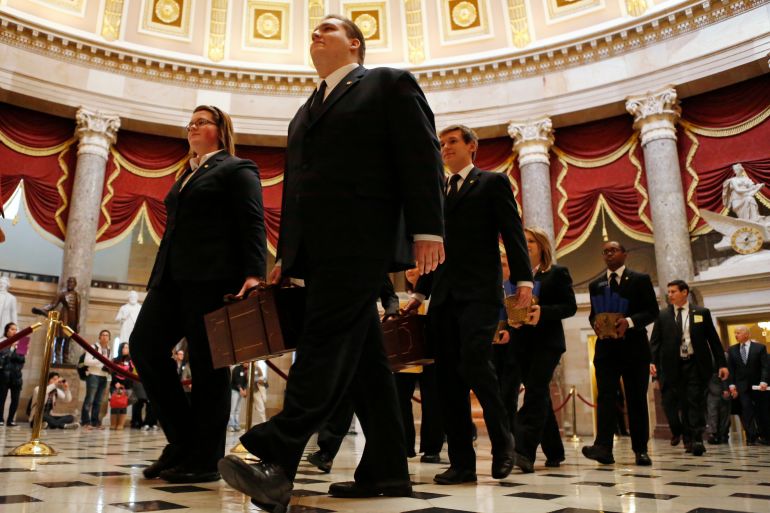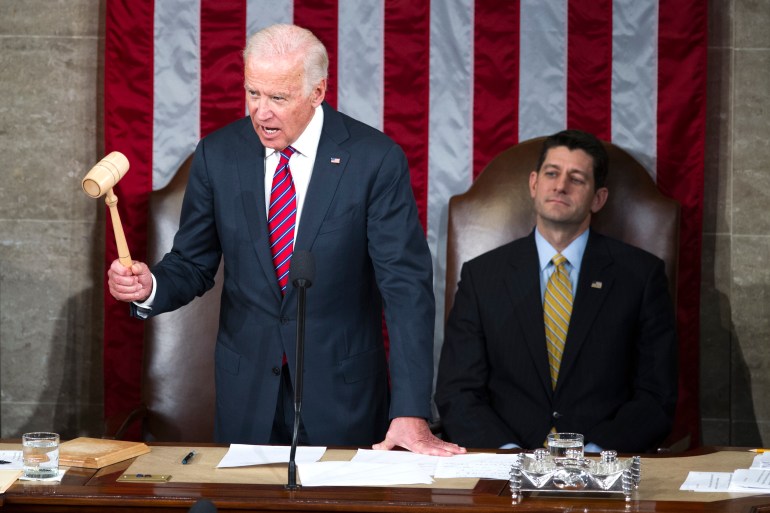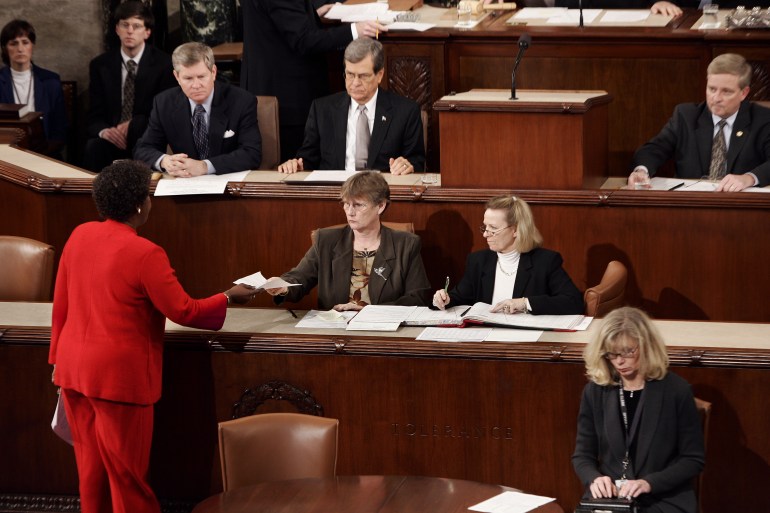What to expect when US Congress meets to affirm Biden’s win
Republicans, goaded by Trump, promise to slow down the inevitable: Joe Biden’s last official step to the presidency.

The US Congress meets on Wednesday to tally the Electoral College votes, the final constitutional step in determining the next president of the United States.
In an ordinary presidential election year, this ceremonial and non-controversial joint session of Congress is the culmination of a hard-fought campaign. But the 2020 presidential election and its aftermath were anything but ordinary. And now, President Donald Trump and many of his congressional backers are hatching plans to protest President-elect Joe Biden’s Electoral College victory, though their plans are doomed to fail.
Keep reading
list of 4 itemsOfficials brace for pro-Trump march on Washington, DC
Georgia elections official: Trump phone call ‘not normal’
Trump call is the latest episode in growing rift with Republicans
What happens when Congress meets?
At 1pm (18:00 GMT), the House and Senate will convene a joint session of Congress, presided over by the vice president in his role as president of the Senate, to conduct the constitutionally prescribed counting of the Electoral College votes, which were determined by the results of the November 3 presidential election.
On December 14, electors in all 50 states and the District of Columbia met to cast their votes: 306 for Biden, 232 for Trump. A candidate needs 270 electoral votes for victory. Congress on Wednesday will count those votes, making Biden’s election official once and for all, paving the way for his inauguration on January 20 at noon (17:00 GMT).

Seems pretty cut-and-dried?
Traditionally, this is a pro forma ceremonial event with little drama: Congress meets, counts the votes, and the president-elect goes on to be sworn in on January 20.
However, Trump and his allies have spent the past two months contesting the election results and, in some cases, actively trying to overturn the results in court or via pressure on governors, state legislators and elections officials. Having failed with every effort so far, Trump and his allies are hoping to exploit some vagaries in the Electoral Count Act of 1887, which was implemented to clarify the post-election process after the contested 1876 presidential election.
The Electoral Count Act set into law procedures for counting the electoral votes and was designed to mainly take Congress out of the equation of election disputes, leaving those issues to be dealt with at the state level.
The act does allow members of Congress to challenge the electoral votes of a particular state, although for very limited reasons.
If one House member and one Senate member, in writing, object to a state’s vote, the joint session recesses and the House and Senate separately debate and vote on the objection before returning to the joint session to present their results.
“Unless both the House and Senate vote to reject the Electoral count for the state in question, the objection is rejected,” House Speaker Nancy Pelosi explained to her fellow Democrats in a letter Sunday. “We then reconvene and proceed to the next state in the roll call.”
Who is objecting and why?
Citing unfounded claims of voting irregularities, at least 140 Republican House members and 13 senators have said they will vote to object – not enough to toss out a state’s electoral votes.
Among the states whose votes could be objected include Arizona, Georgia, Michigan, Nevada, Pennsylvania and Wisconsin.
Missouri Senator Josh Hawley, who, in defiance of Senate Republican Leader Mitch McConnell, has committed to objecting in writing, argued voters in his state want him to raise questions about “election integrity”.
#January6 is my opportunity to speak for my constituents and to force a debate on election integrity, and that’s exactly what I’m going to do pic.twitter.com/Fjb4oGlmyk
— Josh Hawley (@HawleyMO) January 5, 2021
Alabama Representative Mo Brooks, who kicked off the objection effort last month, has repeated Trump’s unfounded claims that the election was “stolen” and that there was rampant “voter fraud”.
Promises made. Promises kept.
Today I signed objections to tainted electoral college vote submissions of Arizona Georgia Michigan Nevada Pennsylvania Wisconsin.
Senators? Time to sign on, too!
America must not tolerate voter fraud & election theft that undermines our Republic! pic.twitter.com/9kzwqbRZuK
— Mo Brooks (@RepMoBrooks) January 4, 2021
Numerous congressional Republicans have pushed back and said they will not participate in the objection gambit.
Are the objections unprecedented?
Members of Congress have spoken up many times during this ceremony in recent years, but a full objection – one House member and one Senate member objecting in writing – has only happened twice since 1877, most recently in 2005.
Democratic Representative Stephanie Tubbs Jones and Senator Barbara Boxer objected to Ohio’s certified electoral votes for George W Bush. The objection was overwhelmingly rejected by both the House and Senate.
While Boxer has since defended her objection arguing that the circumstances in 2005 were quite different, specifically that Democratic presidential candidate John Kerry had conceded the election, something Trump has yet to do, some feel that effort gave future objectors cover to pull the same stunt.

“These shenanigans were wrong when the Democrats tried them, albeit on a far smaller and less disruptive scale, and they remain wrong,” Ohio State University law professor Edward Foley, an election law expert, wrote in the Washington Post Monday.
What is Mike Pence’s role in all of this?
As spelled out in the 12th Amendment of the US Constitution, the vice president, who is also the president of the Senate per the Constitution, presides over the joint session for the vote tally.
His or her role is spelled out as such: “The President of the Senate shall, in the presence of the Senate and House of Representatives, open all the certificates and the votes shall then be counted”. Seems pretty simple.
However, Trump declared on Monday that he hopes “our great vice president, comes through for us … Because if he doesn’t come through, I won’t like him quite as much.” Trump tweeted further on Tuesday that Pence “has the power” to reject electors, which is false, election law experts agree.
The Vice President has the power to reject fraudulently chosen electors.
— Donald J. Trump (@realDonaldTrump) January 5, 2021
Pence has reportedly told Trump he will not pull a stunt that would attempt to alter the election’s outcome. But if Pence does try to placate Trump, no matter which out-of-the-ordinary scenario he attempts, it almost certainly will not result in a second term with Trump as president.
Election law experts have argued that Pence does not have the constitutional or legal authority to mess around with certified electors. And even if he tried, any attempt will be overruled by a majority Democratic House and a Senate where several Republicans are on the record saying they will not support any subversive efforts.
So, how does this all end?
It is expected that what is normally an expeditious ceremonial event could drag on late into the evening, and perhaps the next day, due to the delays caused by Republican objections.
Trump and his hardcore supporters hope that their “Hail Mary” effort will change the outcome of the election. However, there is no realistic scenario that will result in anything but Biden’s victory being affirmed after all is said and done, no matter how long Congress takes to tally the votes.